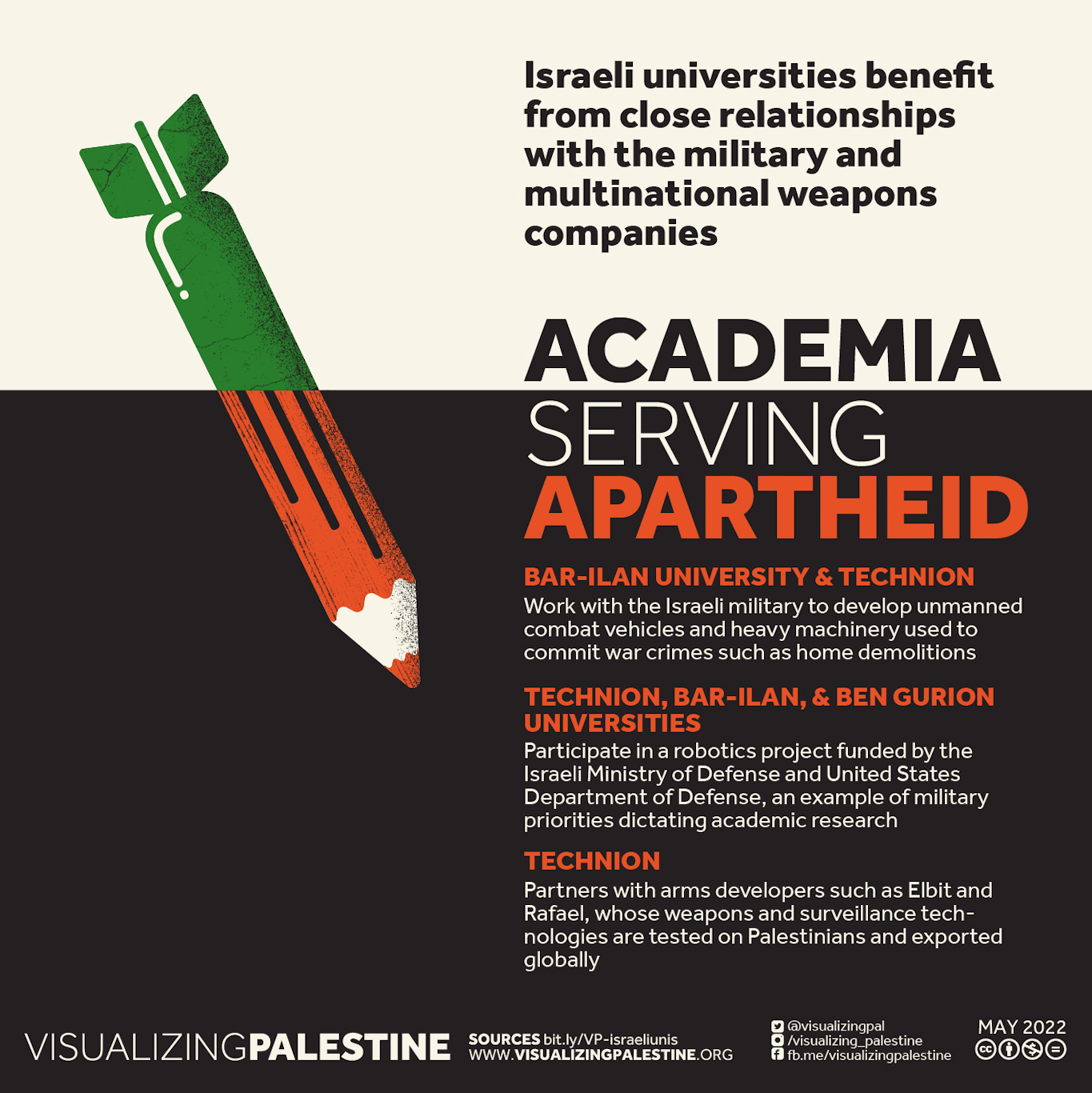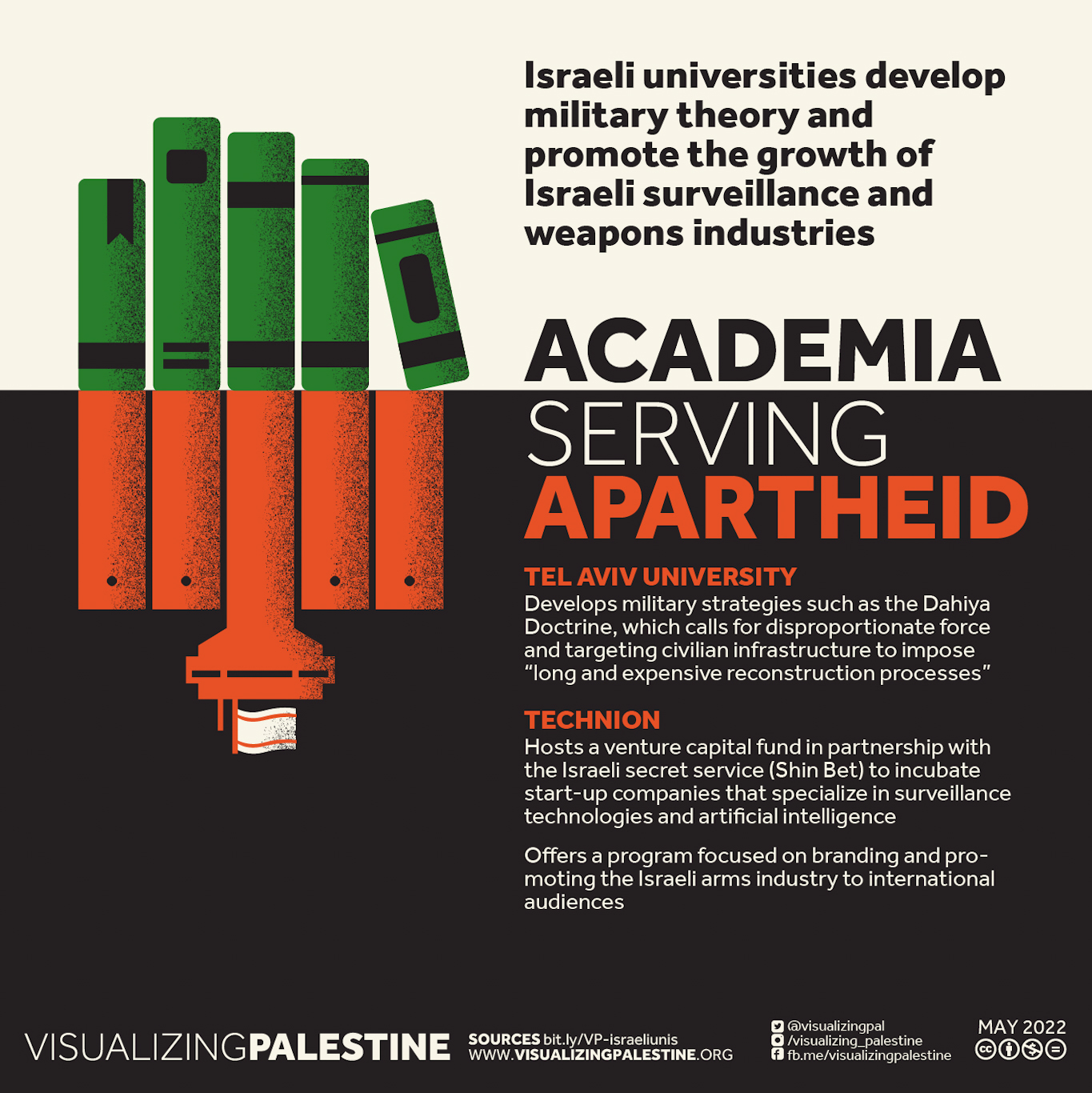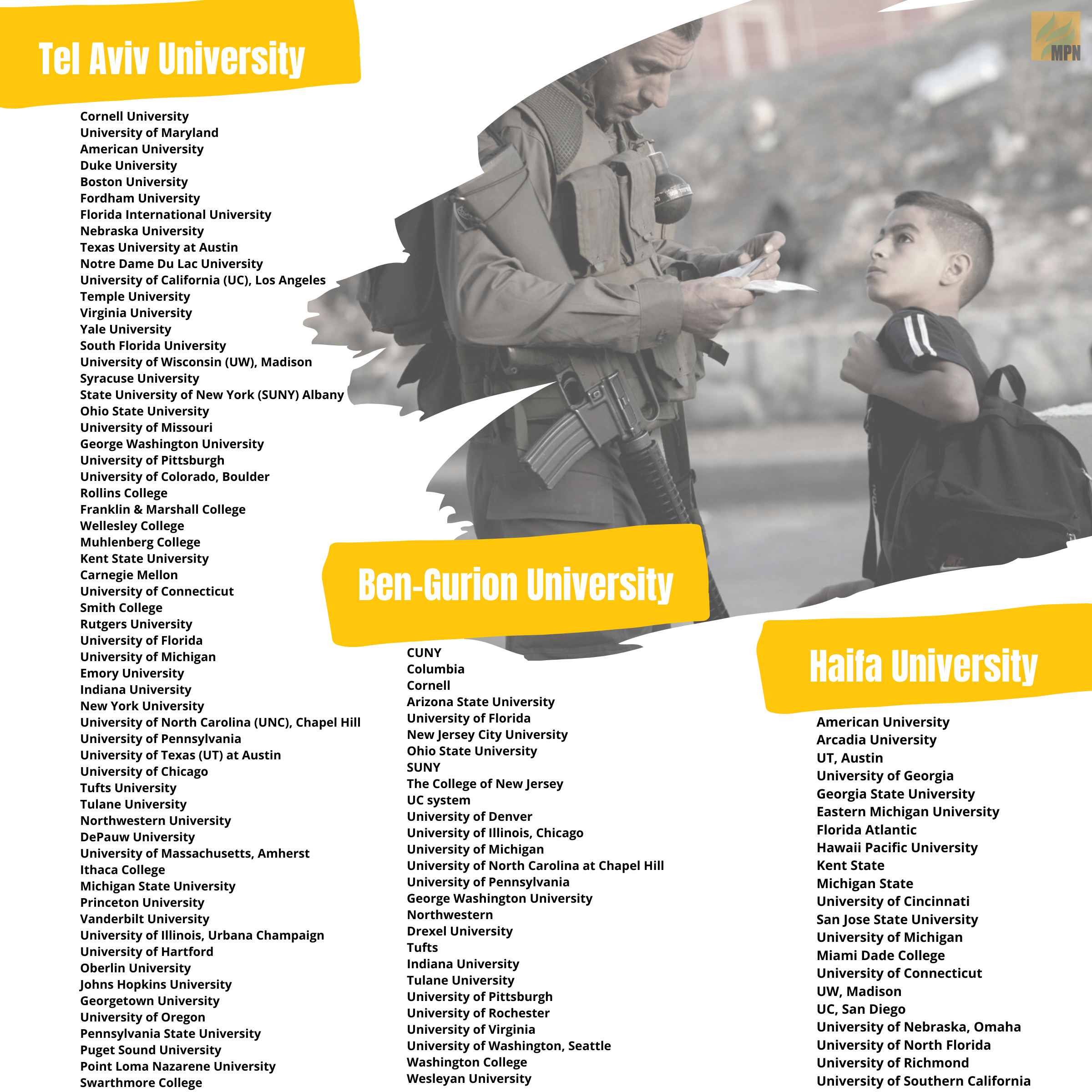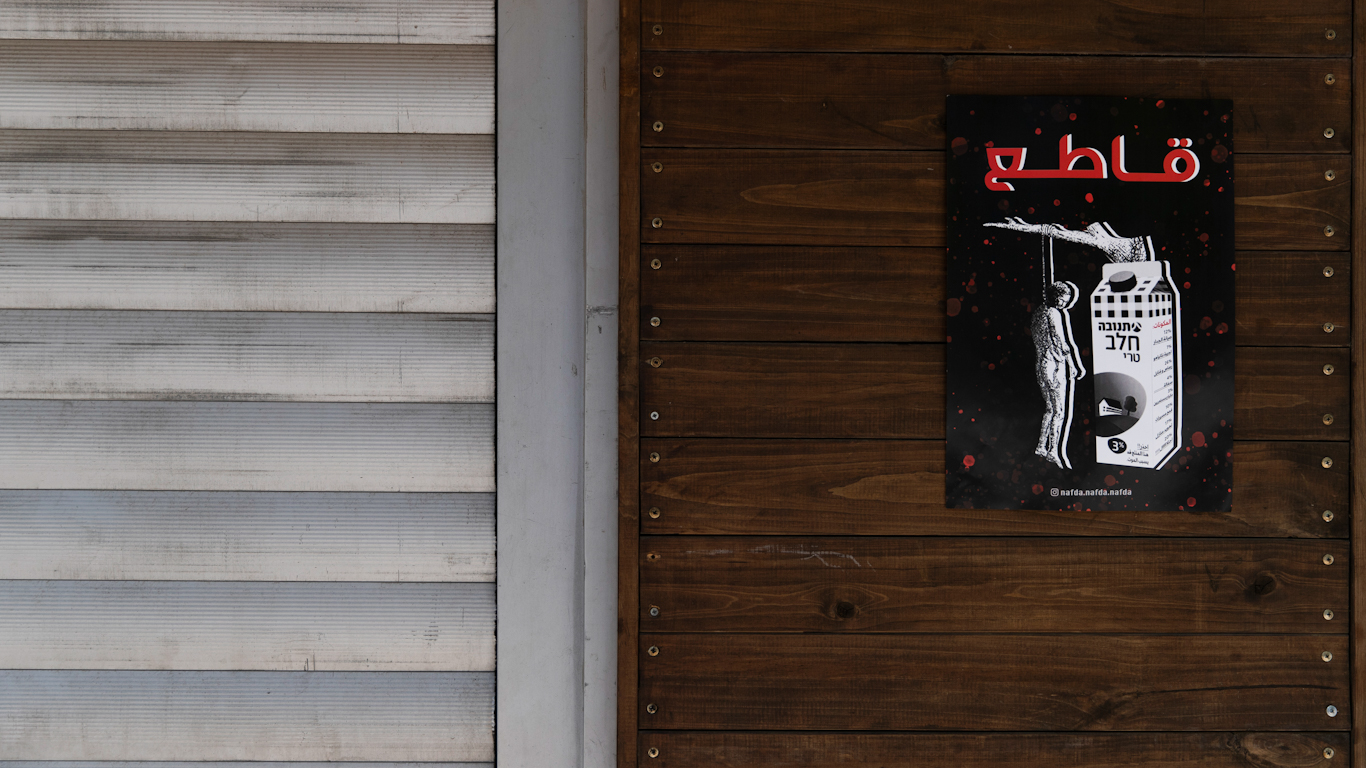TEL AVIV, ISRAEL — This month, City University of New York’s (CUNY) law school faculty unanimously passed a resolution endorsing the Boycott, Divestment and Sanctions (BDS) Movement, joining a chorus of American universities advocating for Palestinian rights. Harvard University’s Crimson newspaper endorsed the movement earlier this year, with 50 of the school’s faculty members supporting the decision. And in March, the Middle East Studies Association also voted to endorse the BDS movement.
As college campuses across the U.S. grow in their support for Palestine, their administrations – many still having relations with major Israeli universities complicit in Israel’s occupation of Palestine – appear less likely to agree. With that in mind, BDS activists urge supporters to boycott Israeli academic institutions.
How Israeli universities are complicit
As illustrated by Visualizing Palestine, a data-driven project crafting graphics on the Palestine-Israel issue, several notable Israeli universities assist the state in maintaining its oppression of Palestinians. Tel Aviv University, Hebrew University, Ariel University, Haifa University, Bar-Ilan University, Ben-Gurion University of the Negev, and the Technion Institute of Technology all contribute to ongoing colonial violence.


For instance, Tel Aviv University invites weapon manufacturers like Elbit Systems to its annual Technology Employment Fair and invites students to Elbit Systems events for the purpose of recruitment. The school has also played a role in establishing the Israeli army’s military doctrines and ethical codes and training students to provide legal defense through its army reserve program. The school’s Greenberg National Institute of Forensic Medicine is currently keeping 63 Palestinian corpses in a medical lab freezer as part of Israel’s policy of withholding bodies to use as bargaining chips in future negotiations.
Technion also works with arms developers, partnering with Elbit Systems and Rafael Advanced Defense Systems on research projects. Technion, Ben-Gurion, and Bar-Ilan all participated in building a humanoid robot with funding provided by the Israeli and U.S. defense departments. Bar-Ilan and Technion also collaborate with the Israeli military to develop equipment used in executing home demolitions.
Hebrew University coordinates with the Israeli police in harassing and surveilling nearby Palestinian communities. Haifa University hosts a program training students on how to become “digital advocates for Israel.” And Tel Aviv University, Hebrew University, Ben-Gurion, and Haifa University offered benefits and scholarships to students who participated in the military assault on Gaza in 2014.
These universities are deeply entwined in Israel’s apartheid, making their American partners also indirectly complicit.
American academia and Israeli apartheid
Despite growing calls from student activists for their schools to support the BDS movement, American universities continue to collaborate with Israel.
“The university is putting itself at risk of importing the racist policies of the Israeli state into university campuses because of the collaboration that’s required,” Nasreen Abd Elal, information designer at Visualizing Palestine, told MintPress News. Abd Elal was referring to Columbia University’s dual degree program with Tel Aviv University, which was launched in 2020. She was involved in the student campaign against it at Columbia.
Columbia isn’t the only American school linked to complicit Israeli universities, though. Many of the U.S.’ leading universities coordinate with Israeli institutions. The following schools have study-abroad exchange programs or research partnerships with Tel Aviv University, in addition to Columbia and CUNY:

Technion and Cornell partnered together to create the Jacobs Technion-Cornell Institute in 2011. Washington University of St. Louis partners with Technion through its McDonnell International Scholars Academy. The University of Illinois partners with both Tel Aviv and Hebrew University through its research center, Discovery Partners Institute. In 2019 Ariel University, which is located in an illegal Israeli settlement in the occupied West Bank, announced a partnership with Florida Atlantic University.
Many of these academic institutions are also heavily invested in Israeli companies, including Columbia, Tufts, UNC, and Urbana-Champaign. Harvard grabbed headlines in April when its newspaper endorsed the BDS movement, but the school maintains investments in several companies listed on the UN’s database of companies involved in Israel’s illegal settlement enterprise. These include Bookings Holdings, Expedia, General Mills, and Motorola.
While BDS campaigns across college campuses have gained momentum, to this day no American university has actually divested from Israel.
Not just academia
Schools aren’t the only ones associating with Israeli universities. Several American companies also have ties.
Technion has partnered with American corporations Google, IBM, Intel, Nvidia, KLA, Amazon, Medtronic, Cisco, Marvell, and Cadence Design Systems. IBM has also participated in events with Ariel University, according to the research center Who Profits from the Occupation. Software company PTC began collaborating with Technion on a research and development center in 2021.
BGN Technologies, Ben-Gurion’s technology transfer company, established its Advanced Technologies Park. The park’s tenants include American firms dbMotion and Oracle. BGN Technologies also works with American entities the Georgia Institute of Technology, Nexant, Delek US, Duquesne Light Company, Schweitzer Engineering Laboratories, and the MITRE Corporation, through its joint consortium related to developing cyber protection infrastructure.
And the Cleveland Clinic Foundation entered into an academic cooperation agreement with the Hebrew University in 2017.
Suppressing Palestinian academic freedom
BDS resolutions in academia aren’t passing at a record or even significant rate, but Abd Elal says the administrative reaction to those that have passed demonstrates the movement is working:
The instinctual response of administrators tends to come out swinging in opposition saying, “We’ll never commit to divestment.“ But the fact they feel obliged to respond is provoking that confrontation. Students and faculty are seeing how the university will throw out the democratic mandate because of their interest in maintaining good relationships with their investors.”
Abd Elal added that these campaigns have managed to garner a groundswell of support, and that, in itself, is powerful. “There have been significant strides made in building solidarity on campus and getting people to commit to not going to these institutions and putting pressure on the administration to end [the agreements],” she said.
The call for an academic boycott goes beyond the institutional level, however. “The Israeli state and occupation marginalize Palestinian students and universities and restrict access of international scholars and students to Palestinian universities, which is a significant threat to academic freedom,” Abd Elal said.
In February, the Israeli Defense Ministry’s Coordinator of Government Activities in the Territories (COGAT) published new instructions on foreign entry into the West Bank. These guidelines included a swath of new restrictions for individuals wishing to learn or work at Palestinian universities. Foreign lecturers must hold a doctorate and can only teach in certain fields. COGAT will permit only 150 foreign students at Palestinian universities each year and can limit the fields of study open to them.
As detailed above, many American universities have academic agreements with Israeli universities. Yet promoting a free exchange of ideas between Israeli and American academics tends to ignore the crippling hold Israel has on Palestinian education.
Abd Elal explained that Visualizing Palestine’s graphic wasn’t meant to just describe how Israeli universities are complicit in apartheid, but also how the Israeli state has an interest in suppressing Palestinian academic freedom. “The occupation really cuts off Palestinians from the academic community,” she said. “So for that reason, the academic boycott is a key way of standing in solidarity with our academic peers.”
Feature photo | Nasser Nasser | AP
Jessica Buxbaum is a Jerusalem-based journalist for MintPress News covering Palestine, Israel, and Syria. Her work has been featured in Middle East Eye, The New Arab and Gulf News.


